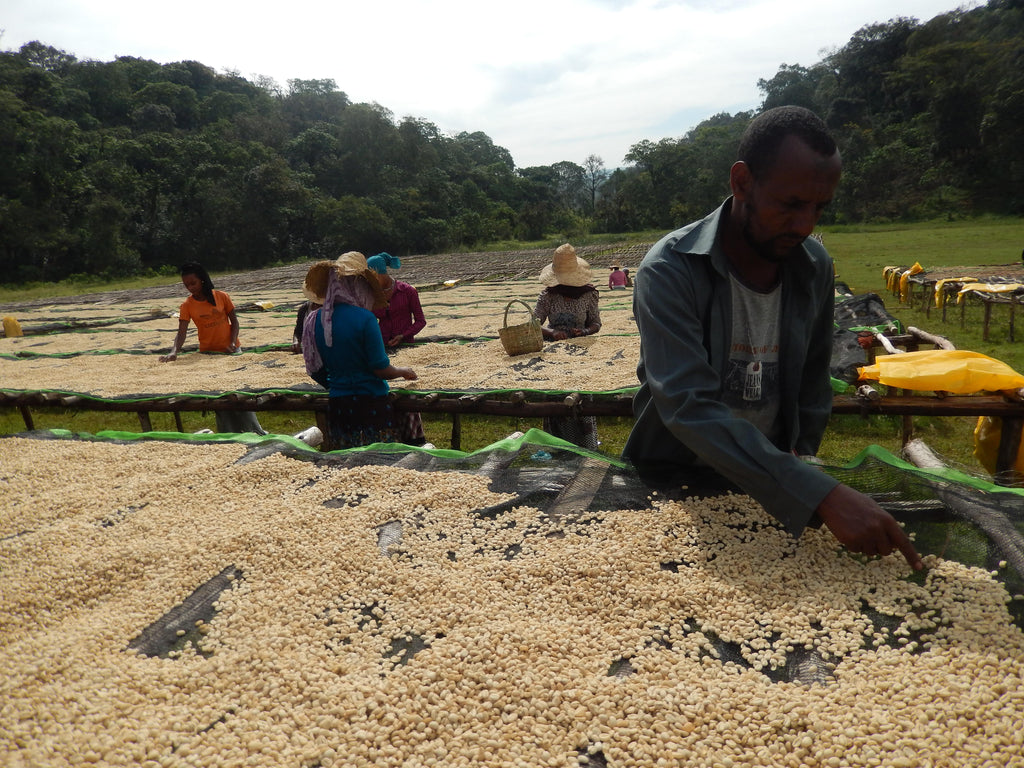When considering how important investment in infrastructure and processing is, few coffees provide a more glaring example than this lot of organic coffee from the Jimma region, in southwestern Ethiopia. In a country renowned for the quality of its coffees, this once overlooked region has been receiving a lot of well-deserved attention from the coffee community over the last few years.
This year, the sample of this coffee we cupped blew us all away, and we knew we had to purchase it and share it with our customers. It's one of the best Ethiopian coffees we've ever had; yes, it's that good. We've been very fortunate to be able to secure this lot, and we're excited to roast and serve it - and not only because of how good it is, but also because of the unique social benefits this coffee has for the people who cultivated it.
So what makes this particular coffee so special? In order to answer that, we'll need to dive a little into the story behind the Duromina collective, and the development of coffee cultivation in the Jimma region.

Jimma's history of coffee production is emblematic of how challenging it can be for farmers to produce coffee to be sold at above commodity prices. This region has everything great cherries love - ideal climate and altitude conditions, fertile and nutrient-rich soil, and plenty of rain throughout the year. And yet, the coffees grown in the region were, for years, sold only as low-quality, commodity-grade coffees. The local farmers themselves knew that the issue wasn't in the varietals or the growing conditions - but rather a lack of resources, financial and logistical, that prevented them from fully benefiting from their crops' quality. So they decided to something about it.
In 2010, 113 local farmers formed a cooperative, and the name they chose for it was their mission statement: Duromina means "to improve their lives"/"to enrich them" in the local Afan Oromo language. Establishing the cooperative was a necessary step in leading the local coffee-growing community to a more profitable future. By pooling their resources there and forming a joint front, Duromina's members were able to secure financing and technological support from TechnoServe, an non-profit organization operating several coffee-focused social programs.
The resources it acquired enabled the Duromina cooperative to move away from the traditional method of naturally drying the cherries in the sun, switching to the washed method instead, which was crucial for unlocking the heirloom coffee's sweetness potential. Duromina's harvests quickly gained popularity, and almost immediately started scoring very high in various coffee competitions, which led us, years ago, to cupping and purchasing one of their lots.
The success of this business program was impressive. The cooperative was able to repay all of its loans in one year, three years ahead of schedule. Some of the profits were used in developing crucial infrastructures, such as building a stone bridge that connects the local villages to the nearest hospital and municipal offices. For an impoverished region like Jimma, such a profitable business model, operated by local farmers, makes a real difference.
The Duromina cooperative has done an incredible job, building an enterprise that is commercially successful, quality-driven, and socially-minded - all at the same time. We recommend trying this coffee, not just because of how great it is, but also in order to get a sense of just how remarkable the work of this farming community has been over the last decade.


Leave a comment